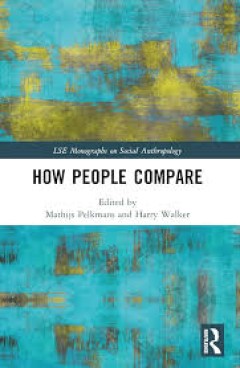Filter by
Found 1 from your keywords: author="PELKMANS Mathijs"

HOW PEOPLE COMPARE
This book focuses on comparison in anthropology, turning an ethnographic lens onto the diversity of comparative practice. It seeks to understand how, why and with what consequences diversely situated groups of people – many of whom operate on radically different premises to professional anthropologists – make comparisons, above all, between themselves and real or imagined others. What motiv…
- Edition
- -
- ISBN/ISSN
- 9781003283669
- Collation
- -
- Series Title
- -
- Call Number
- -
 Computer Science, Information & General Works
Computer Science, Information & General Works  Philosophy & Psychology
Philosophy & Psychology  Religion
Religion  Social Sciences
Social Sciences  Language
Language  Pure Science
Pure Science  Applied Sciences
Applied Sciences  Art & Recreation
Art & Recreation  Literature
Literature  History & Geography
History & Geography